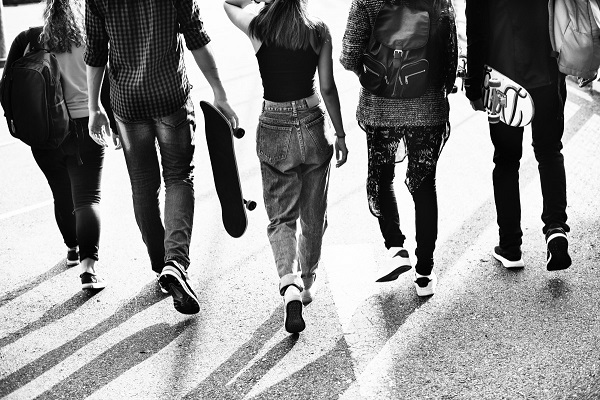
–>
October 21, 2022
Before the devastating psychological effects of the COVID lockdowns, the U.S. faced a frightening rise in drug addiction, with youth suicide becoming the second-leading cause of death among people aged 15–20 in the U.S., and suicide in children quadrupling from 2007 to 2020.
‘); googletag.cmd.push(function () { googletag.display(‘div-gpt-ad-1609268089992-0’); }); }
What’s behind this alarming trend? Let’s consider what the young need to thrive.
Infants and young children constantly challenge themselves to learn the next hardest thing — how to walk on uneven surfaces, how to run down a hill, how to say “rain boot.” As they grow, the challenges become psychologically complex.
Significant purposes are critical to their motivation, including a vision of work as important to achieve independence. Vital are a hopeful view of the future, a vision that life can be an adventure worth the striving, and heroes that embody the highest reaches of human nature. Without these elements, the young are lost, adrift — only too susceptible to depression and even suicide.
‘); googletag.cmd.push(function () { googletag.display(‘div-gpt-ad-1609270365559-0’); }); }
Throughout life, humans need inspiration to get through the difficult and dreary parts. Where do the young find it today? Our culture is schizophrenic: on the one hand, Intel’s commercial “We believe there’s an innovator in everybody” captures the classic American excitement toward challenge with financial reward. On the other hand, running rampant are cynicism, resentment of achievement, intolerance toward differing ideas and values, and a bleak picture of the future based on the premise that human technology is destructive, expressed in the drumbeat of climate change disaster, artificial intelligence boogeymen, and the soul-crushing nature of capitalism.
How do you nurture resilience and grit, when the news, TV, friends, teachers, videos, tweets, and posts tell the young that the world is going to hell in a handbasket, humans are to blame, and there’s no hope?
Many young adults feel they mustn’t bring children into this world. Forty-four percent of U.S. non-parents between the ages of 18 and 49 years said they’re unlikely to have children, according to a Pew Research Center study, up from 37% in 2018.
Then there’s the dark, depressing anti-heroic outlook celebrated in the past 40 years.
For example, the 1995 film Leaving Las Vegas, about an alcoholic and a prostitute slowly killing themselves, received multiple Academy Award nominations. Contrary to real life, businessmen are relentlessly cast as murderous, greedy villains. Billions turned the self-made hedge fund CEO into a violent criminal. Silicon Valley portrayed tech entrepreneurs as lying, vain narcissists, not productive geniuses.
Worse is the elevation of evil to heroism. The Joker was the highest grossing film of 2019 and received 11 Academy Award nominations. It masterfully seduces the viewer into sympathizing with the murderous, nihilistic Joker and reviling heartless capitalist Bruce Wayne (Batman).
‘); googletag.cmd.push(function () { googletag.display(‘div-gpt-ad-1609268078422-0’); }); } if (publir_show_ads) { document.write(“
Such stories turn the young away from the creative, productive challenge of business, capitalism, and markets and encourage them to think that working as a hipster barista or green NGO supply manager is the moral course.
Instead, Top Gun: Maverick is a tornado of fresh air among dank Hollywood offerings. It portrays masculine men of great competence and bravery, unwilling to sacrifice any individual to the mission but, instead, dedicated to nothing less than total victory. Quite the contrast to young men who need to be told “make your bed” — or who cheat at West Point.
Its artistic power is a clue as to how we can arm the young against this onslaught of depressing messaging: by offering them intelligently curated movies, videos, TV shows, music, books, statues, games, and advertising images, showing them that life can be wonderful.
I noticed that all my grandchildren — who live far apart — love Paw Patrol, a cartoon show about capable children and child-like animal characters who rescue adults and children — using technology. Achievement, heroism, and the celebration of human invention — this is what 3- to 6-year-olds like!
The huge fandom for superheroes evidences the young’s tremendous desire for inspiration —because there are not enough stories about human heroes. The gulf between older stories and today’s can be a chasm.
Stories of young people with gumption, such as Treasure Island or Goonies,
Robert Heinlein’s Starman Jones, Space Cadet, and Have Space Suit — Will Travel dramatize independent, courageous problem-solving in formidable situations.
The last title echoes long-running Have Gun, Will Travel, a Western filled with strong moral conflict, terrific challenges, and creative solutions. Captains Courageous; The Big Country; The Sea Hawk; Robin Hood; and Westerns such as High Noon, Shane, and The Man From Snowy River all depict courage, valor, and an elevated sense of romance.
The astounding success of the Les Misérables musical rests on its great story of heroes, conflict, struggle, romance, and redemption. More recently, Bridge of Spies is a terrific tale of a real-life hero with integrity, resolute courage, and quiet conviction.
Reality TV shows such as Undercover Boss and Dirty Jobs heroize hard work and exceptional individuals in all walks of life. The Call of the Entrepreneur documentary, about a dairy farmer, an investment banker, and a media mogul, brilliantly depicts this.
Young people’s interest in videogames outstrips music and movies. Creative world-building games such as Minecraft fit the motivational bill. It is one of the most popular in this genre, but even those involving warcraft can be inspirational. See this discussion exploring the virtues of videogames. And let’s not forget music, especially with great melodies and romantic lyrics, which make one’s spirit soar.
Parents especially need to teach their children the value of their own work, letting them know how it adds to the world, no matter what it is. You are your children’s first hero — make sure they know why.
Marsha Familaro Enright, M.A. Psychology, is an educational entrepreneur, teacher, and writer. She runs The Reason, Individualism, Freedom Institute, now working on opening Reliance College, www.reliancecollege.org. She founded, and ran for 27 years, Council Oak Montessori School for ages 3–15. Marsha-familaro-enright.com.

Image via Pxhere.
<!– if(page_width_onload <= 479) { document.write("
“); googletag.cmd.push(function() { googletag.display(‘div-gpt-ad-1345489840937-4’); }); } –> If you experience technical problems, please write to [email protected]
FOLLOW US ON
<!–
–>
<!– _qoptions={ qacct:”p-9bKF-NgTuSFM6″ }; ![]() –> <!—-> <!– var addthis_share = { email_template: “new_template” } –>
–> <!—-> <!– var addthis_share = { email_template: “new_template” } –>






